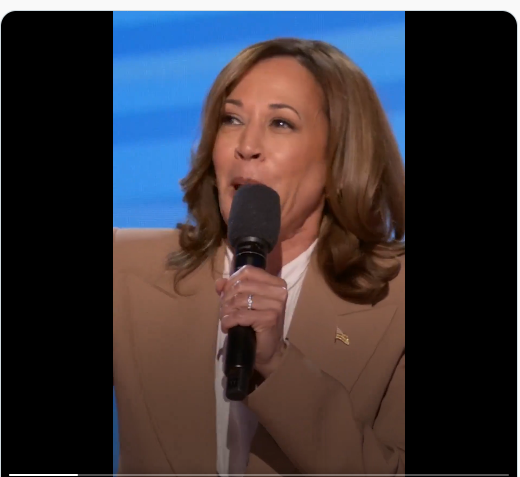
(Photo : X account)
- Vice President Kamala Harris accepted the Democratic presidential nomination, promising to fight tyranny and end the Gaza war.
- Harris outlined her foreign policy principles and contrasted herself with her Republican rival, Donald Trump.
- On the domestic front, Harris proposed a middle-class tax cut and criticized Trump's policies.
- Harris's acceptance marked a historic moment, potentially making her the first woman elected U.S. president.
In a historic moment, Vice President Kamala Harris accepted the Democratic presidential nomination, marking a significant milestone in American politics. The acceptance took place on the final night of the Democratic National Convention, held at the United Center in Chicago, which was filled to capacity with 23,500 attendees. Harris, 59, delivered a powerful speech, outlining her broad foreign policy principles and drawing sharp contrasts with her Republican rival, Donald Trump.
Harris, who emerged as the Democratic candidate just over a month ago, promised to be a realistic, practical president for all Americans. She pledged to stand firm in the enduring struggle between democracy and tyranny, accusing Trump of bowing down to dictators. She vowed to support NATO, Ukraine, and confront Putin's aggression, a clear reference to Russia's president.
The vice president also addressed the ongoing conflict in Gaza, promising to secure Israel, bring the hostages home, and end the war in the Palestinian enclave. Now is the time to get a hostage deal and a ceasefire deal done, she said, amid cheers from the audience. She emphasized her commitment to Israel's right to defend itself and assured that she would always ensure Israel has the ability to do so.
Harris's Domestic Policy and Criticism of Trump
On the domestic front, Harris announced a major policy proposal to pass a middle-class tax cut that would benefit more than 100 million Americans. This proposal was presented as an alternative to what she characterized as a Trump tax hike. She also discussed her plans to fight for abortion rights, voting rights legislation, boost the housing supply, and ban what she has called price gouging by grocers. Her campaign has also proposed raising the corporate tax rate from 21% to 28%.
Harris drew a series of contrasts with Trump, accusing him of not fighting for the middle class, planning to enact a tax hike through his tariff proposals, and having set in motion the end of a constitutional right to abortion with his picks for the U.S. Supreme Court. She noted the Supreme Court's recent ruling about presidential immunity and the risks that would pose if Trump gained power again. Just imagine Donald Trump with no guard rails, she said.
Trump, who had promised to respond to Harris' speech in real time, posted a series of messages on Truth Social as she spoke about him, including: She stands for Incompetence and Weakness - Our Country is being laughed at all over the World! and She will never be respected by the Tyrants of the World!
Historic Moment and Personal Stories
Harris's acceptance of the Democratic nomination was not just a significant moment for her, but also for the United States. If successful, she stands to make history as the first woman elected U.S. president on Nov. 5. This historic moment was marked by a series of high-profile appearances and performances at the convention, including Oprah Winfrey, Stevie Wonder, and John Legend, among others.
Harris's speech was not just about policy and politics. She also shared personal stories, including the lessons she learned from her mother, Shyamala Gopalan, who came to the U.S. from India at the age of 19 to be a scientist working on a cure for breast cancer. Harris said her mother raised her and her sister Maya to "never complain about injustice" but to "do something about it."
In her speech, Harris also addressed the issue of Iran, promising to take whatever action was necessary to defend U.S. interests against the country. She said tyrants and dictators, including North Korea's Kim Jong Un, are rooting for Trump. This stance was met with mixed reactions, with some foreign policy observers warning that if she wins in November, the Harris administration will continue Biden's relatively "soft" approach toward the Islamic Republic of Iran.
Essentially, Harris's acceptance speech was a powerful articulation of her vision for the country, both in terms of foreign and domestic policy. It was a forceful speech for a candidate who, during her brief campaign, had yet to articulate much of her vision for the country. Harris has faced a stream of personal attacks from Trump, who called her weak on the foreign stage. However, her speech at the Democratic National Convention showed a candidate ready to take on these challenges and lead the country forward.









